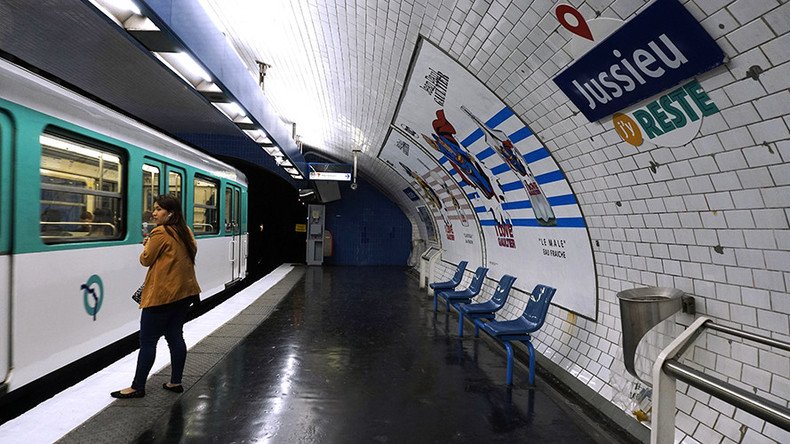‘It’s like asbestos!’ Paris Metro staff protest underground air quality

Paris Metro workers are taking action to highlight the hazardous air quality in the city’s underground rail network – a threat one labor leader has likened to asbestos.
Some 60 members of the CFDT workers’ union handed out pamphlets at Gare du Nord, the French capital’s main transport hub, on Friday to warn commuters of the poor air quality below ground.
“Breathing in the tunnels of the metro and RER seriously damages your health,” the pamphlet read, before stating that 380 micrograms of hazardous fine particles with a diameter of less than 10 micrometers were recorded during peak hours at Les Halles station in June.
By way of comparison, Le Monde revealed Thursday that readings from an outdoor air monitoring station near Chatlete-Les Halles in central Paris recorded readings of 27 micrograms of fine particles of 10 micrometers or less during similar hours in July.
The safe limit for fine particles is set at 80 micrograms while the alert for Paris is fixed at 50 micrograms.
Police march through #Paris to protest poor working conditions (PHOTOS, VIDEO) https://t.co/mONWU3xloEpic.twitter.com/C6DOvw4dZp
— RT (@RT_com) September 16, 2017
"Those who work in the tunnels, when they blow their nose, it's all black, as if they were working in a mine," CFDT Secretary General Fabian Tosolini told Le Parisien. "It is a scandal comparable to that of asbestos.”
The Paris Metro employs around 26,000 people in the greater Paris region of Ile-de-France, with many of their contracts stipulating a maximum threshold for exposure to fine articles at 5,000 micrograms, 100 times higher than for the average worker.
"They're worried because it's their everyday lives. It's not just a question of health at work but also a question public health," Tosolini added.
Naked guitarist seizes moment of fame amid violence of Paris labor protest (PHOTOS, VIDEOS) https://t.co/9e576vmDT0pic.twitter.com/uvYnE0QmNs
— RT (@RT_com) September 13, 2017
Despite protestations by management that the system is being modernized, air pollution on the underground has been a hot topic among commuters.
A report by French channel BFMTV in 2015 revealed that the air on the Paris underground is worse than the Peripherique, the busy ring road that surrounds the city.
In July, France’s Senate published a report saying that air pollution costs the country more than €100 billion per year, most of it on health-related costs.
Other major cities around the world suffer from a similar level of underground pollution.
A study by the Toronto Transit Commission has air pollution levels 10 times greater than above ground with readings of 100 micrograms of pollutants in the air – which is as bad as Beijing.
“We don’t really know the health risks of riding subways,” Greg Evans, lead author of the study, told Gizmodo. “It’s an understudied area.”
Similar studies have been conducted in Barcelona and the South Korean capital, Seoul, with high concentrations of pollution identified in the winter months.












